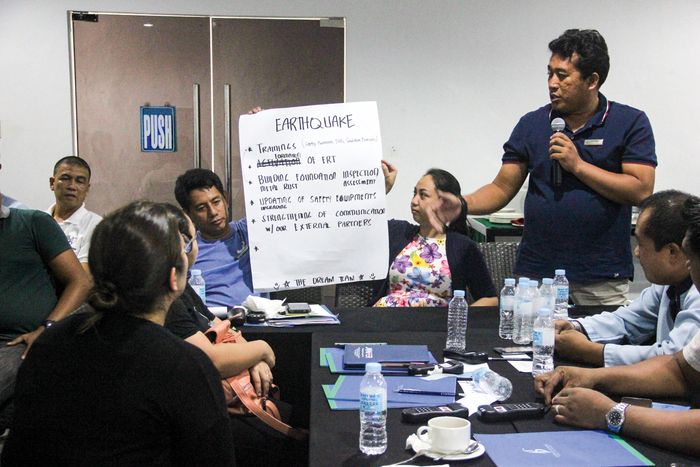The COVID-19 pandemic affected all tourism destinations at the same time. Many regions were simultaneously dealing with forest fires or heavy storms. In the past, hotels have been reluctant to invest into comprehensive disaster planning. However, there is growing evidence that proactive crisis management brings benefits. It will not only increase the safety, reputation and profit of hotels, it can also strengthen community resilience.
Despite the existential crisis faced by the hospitality industry during the COVID-19 pandemic, hotels have helped their host communities and local governments in many ways. Some of them transformed hotel rooms into treatment facilities and provided free accommodation for healthcare professionals working on the frontline. Others served as quarantine facilities or accommodation for “high-risk sub-populations", or provided extra capacities for homeless and refugees, or donated food.
Disaster preparedness – a timely concept
Even in the absence of a global disease outbreak, investing into disaster preparedness in the tourism sector has finally come to be recognized in major global initiatives such as the Sendai Framework for Disaster Risk Reduction (SFDRR, 2015). Disaster and climate resilience must be built into the network of tourism services where tourism is a significant contributor to the economy. Although some destinations are more likely to be affected by disasters than others, all tourism destinations face the virtual certainty of experiencing a disaster of one form or another at some point in their history.
Some global hospitality companies have started investing in Environmental, Social and Governance (ESG) assessments, which include detailed criteria on disaster resilience and climate action. However, most hotels still merely react to emergency situations, rather than proactively analyzing risks. A recent study by the Pacific Asia Travel Association (PATA) found that over 60 percent of hotels do not have a disaster management plan.
Hotels as key agents in disaster response
Hotels can play a particular role in the aftermath of a disaster, providing assistance to surrounding communities as well as supporting economic recovery in the affected area. Hotels can accommodate and feed large groups of people, and serve as a shelter in disasters. Especially in cases of floods and tsunamis, hotels can be used for evacuation. Being equipped with lifesaving equipment, food storage, water tanks, bedding, medical supplies, transportation, and communication channels, hotels can be “islands of resilience” in the aftermath of a disaster. Moreover, much of the infrastructure to run disaster response operations is on site, supported by a robust supply chain network.
Learning from the COVID-19 pandemic
COVID-19 has required many hotels to quickly develop a disaster management plan under the stress and uncertainties of an evolving pandemic. Hotels have had to quickly identify potential threats and make adjustments to their services in terms of enhanced standards of hygiene and physical distancing. All of this had to happen through a lessons-learned process as government regulations are constantly updated. Hotels have also had to develop procedures such as how to handle symptomatic guests and staff or report a confirmed COVID-19 infection. The pandemic has provided an opportunity for many hoteliers to recognize the importance of a robust disaster management plan and resilience strategy.
Following the pandemic, more than ever, there will be opportunities to address resilience and sustainability in a more integrated way. While some hotels as well as some travellers may want to go right back to the way things were, there is a critical mass of customers who are more educated than ever and are making wise decisions about responsible travel. At the same time there are hotels looking at dealing with resilience in a much more serious and holistic way.
Supporting resilient hotels
The challenge lies in capturing this interest and while the topic is complex, not to overcomplicate it. During the pandemic, Hotel Resilient has been working with hotels, offering risk analysis, practical implementation strategies and certification for hotels. While the current focus is on COVID-19 related hygiene and safety to enable hotels to reopen, the aim is to enable resilient operations in the long run. Hotel Resilient emerged in 2020 from the Global Initiative for Disaster Risk Management (GIDRM). It promotes the implementation of internationally recognized resilience standards that are flexible enough to respond to the needs of local communities.
The COVID-19 pandemic has shown that hotels were able to make functional and operational shifts and were able to accelerate the recovery of their destinations. The pandemic points towards the positive impact resilient hotels could have if they were able to make similar shifts towards greater disaster and climate resilience. Without hotels significantly moving beyond ‘business as usual’ in managing their disaster risks, they cannot play an optimal role in contributing to resilience and sustainability in their communities.
Dr. Bijan Khazai is a civil engineer with over 20 years of international experience in disaster risk management and risk assessment. He is the CEO of Hotel Resilient, an advisory body supporting hotels towards implementing climate and disaster resilient standards and innovations. Hotel Resilient is based in Karlsruhe, Germany.


